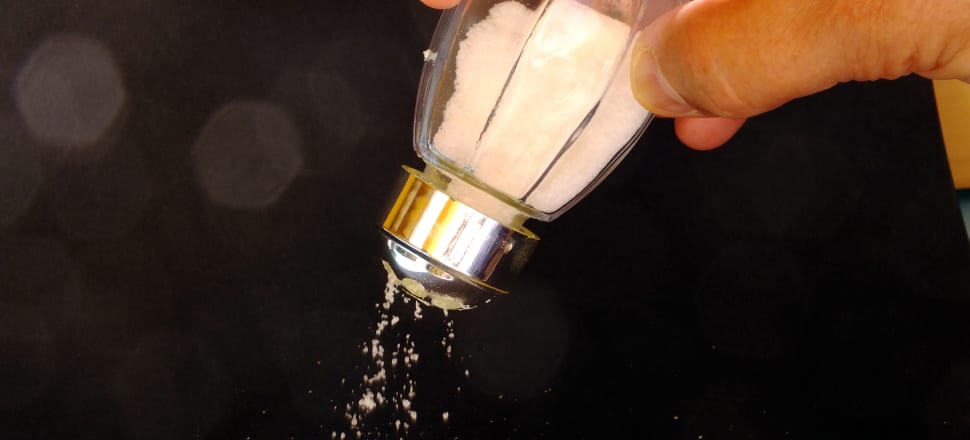
New Zealand rates poorly in a new WHO report rating countries on their actions to reduce salt intake and shows we urgently need a national strategy
Opinion: New Zealand needs urgent action to ensure a safe food supply that will not make us sick in the future.
A high salt (sodium) intake can cause high blood pressure, heart disease and stroke – leading causes of death and disability in New Zealand and globally. Reducing salt intake across the population by 30 percent by 2025 is one of the World Health Organisation’s (WHO) best buys for reducing these conditions worldwide.
Member countries of the WHO (including New Zealand) signed up to do this in 2013, but progress has been variable, despite clear guidance from WHO on how to achieve this target.
Last week, the WHO released its Global Report on Sodium Intake Reduction which scores countries on a scale of 1 to 4 on progress in implementing recommended strategies. Nine countries lead the way with scores of 4/4 (Chile, Brazil, Mexico, Uruguay, Saudi Arabia, the Czech Republic, Lithuania, Spain, and Malaysia) but New Zealand rated only a 2. The report makes very clear what New Zealand needs to do better to improve health.
New Zealand adults eat on average 8.5g of salt a day – 70 percent more than the recommended maximum of 5g a day.
READ MORE:
* Supermarket promotions cost less but we pay for it with our health
* Why Uber Eats isn’t doing you any favours
Most of this comes from salt already in processed food such as breads, sauces, packaged foods, prepared meals, takeaway and restaurant foods. Only 10-15 percent of our total salt intake comes from salt we add in cooking or at the table ourselves.
This means we have limited ability to control the amount of salt we eat, which I believe violates our right to a safe food supply.
What is New Zealand doing?
New Zealand has two main public health programmes that encourage food manufacturers to reduce the salt content of foods – the Heart Foundation’s food reformulation programme and the Health Star Rating front-of-pack label managed by the Ministry for Primary Industries.
Food labelling needs to be improved by making compulsory the Health Star Rating on all packaged foods, and we should introduce a mandatory ‘high in salt’ label for foods that exceed certain thresholds
While both these programmes target salt reformulation – encouraging the food industry to reduce the amount of salt in food products –they are both voluntary and don’t cover the range of foods recommended by the WHO.
Other countries have implemented much stronger and more effective policies. Chile, for example, has a mandatory ‘high in salt’ label for foods that exceed recommended levels, restrictions on marketing of high-salt foods to children and policies that ensure only healthy foods are supplied in public institutions.
South Africa has introduced compulsory maximum limits for salt content in a range of food products that are important contributors to salt intake, as well as a mass media campaign to explain to the public why salt reduction is important and encourage people to reduce salt intake where possible.
What does New Zealand need to do?
Countries that have reduced salt intake in their population have a clear, government-led strategy that includes strong pressure on industry to reduce salt content in processed and restaurant food. We urgently need a national salt reduction strategy that includes public education, and implementation of the WHO global sodium benchmarks.
These are maximum salt levels for a wide range of foods that are safe (from a food-preservation perspective) and palatable. Ideally these should be mandatory, or at least strong pressure should be put on industry to comply with these targets.
Food labelling needs to be improved by making compulsory the Health Star Rating on all packaged foods, and we should introduce a mandatory ‘high in salt’ label for foods that exceed certain thresholds. We also need stronger food procurement and supply policies, ensuring only relatively low salt foods are supplied in national and local government institutions including schools, hospitals, and sports settings.
The WHO has provided clear guidance on what needs to be done to achieve reduced cases of high blood pressure, heart disease and stroke in New Zealand, and other countries around the world have demonstrated that these strategies are achievable with clear government leadership.
What can you do to reduce your salt intake?
Unfortunately, given the current high-salt food supply it is difficult to substantially reduce your own salt intake without cooking everything from scratch (including bread, cereals, and sauces). Supporting a government that is willing to act in this area is a good first step. Beyond this, there are several things you can do including:
* Limiting the amount of salt you use in cooking or at the table: your tastebuds will adapt over several weeks and you will begin to enjoy the flavour of the food.
* Consider using flavour alternatives such as lemon juice, herbs and spices instead of salt. Reduced-salt substitutes are also available in supermarkets.
* Buy ‘low salt’ or ‘light’ foods if available.
* Limit intakes of obviously salty foods such as processed meats and salty snacks.







